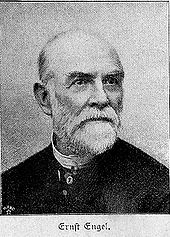Ernst Engel
Christian Lorenz Ernst Engel (born March 26, 1821 in Dresden ; † December 8, 1896 in Serkowitz ) was a German statistician and social economist .
Live and act
Ernst Engel studied at the Bergakademie Freiberg from 1842 to 1845 . On subsequent study trips he met the statistician Adolphe Quetelet .
Ernst Engel was director of the Royal Saxon Statistical Office from 1850 to 1858 and, from 1860, as the successor to Karl Friedrich Wilhelm Dieterici, director of the Royal Prussian Statistical Bureau . After a conflict with Otto von Bismarck , he ended this activity in 1882. Engel was a co-founder of the International Statistical Congress and from 1867 to 1870 a member of the Prussian House of Representatives . From 1867 to 1871 he was a member of the Reichstag of the North German Confederation as a member of the constituency district of Aachen 1 ( Schleiden - Malmedy ) .
From 1882 he lived in retirement in the Villa Engel in Serkowitz , now part of Radebeul , but continued his research. In addition, he was chairman of the supervisory board of the Neubrunn waterworks and of the Lößnitz beautification association . Engel died in Serkowitz in 1896 and was buried in the Trinitatisfriedhof in Dresden.
Engel examined numerous statistics in the area of consumption and demographics. So he set up Engel's law . The Engel curve was named after him.
Works
- The relations of production and consumption in the Kingdom of Saxony . In: Journal of the statistical bureau of the Royal Saxon Ministry of the Interior . No. 8 and 9. 1857. ( digitized at Gallica )
- The methods of the census . 1861.
- The industrial survey and the trade census in the German Empire and in the Prussian state at the end of 1875 . Simion, Berlin 1878 ( digitized version from the University of Cologne )
- The German industry 1875 and 1861. Statistical representation of the distribution of its branches over the individual states of the German Reich, with emphasis on Prussia . Royal Stat. Bureau, Berlin 1880 ( digital copy from the University of Cologne )
- The age of steam in technical-statistical lighting . 2nd Edition. Royal Stat. Bureau, Berlin 1881. ( Digital copy from the University of Cologne )
- La consommation comme mesure du bien-être des individus, des familles et des nations . In: Bulletin de l'Institut International de Statistique 2.1., 1887, pp. 50-75. ( Digitized at Gallica )
- The cost of living of Belgian working-class families then and now. Determined from family household accounts and compiled for comparison . In: Bulletin de l'Institut International de Statistique . 9.1., 1895, pp. 1-124. ( Digitized at Gallica )
Individual evidence
- ^ Mann, Bernhard (edit.): Biographical manual for the Prussian House of Representatives. 1867-1918 . Collaboration with Martin Doerry , Cornelia Rauh and Thomas Kühne . Düsseldorf: Droste Verlag, 1988, p. 122 (handbooks on the history of parliamentarism and political parties: vol. 3); for the election results see Thomas Kühne: Handbook of elections to the Prussian House of Representatives 1867–1918. Election results, election alliances and election candidates (= handbooks on the history of parliamentarism and political parties. Volume 6). Droste, Düsseldorf 1994, ISBN 3-7700-5182-3 , pp. 786-789.
- ^ Fritz Specht, Paul Schwabe: The Reichstag elections from 1867 to 1903. Statistics of the Reichstag elections together with the programs of the parties and a list of the elected representatives. 2nd Edition. Carl Heymann Verlag, Berlin 1904, p. 181; see also Bernd Haunfelder , Klaus Erich Pollmann : Reichstag of the North German Confederation 1867–1870. Historical photographs and biographical handbook (= photo documents on the history of parliamentarism and political parties. Volume 2). Droste, Düsseldorf 1989, ISBN 3-7700-5151-3 , short biography p. 398.
- ↑ Todtenschau . In: Dresdner Geschichtsblätter , No. 1, 1897, p. 24.
literature
- Frank Andert (Red.): Radebeul City Lexicon . Historical manual for the Loessnitz . Published by the Radebeul City Archives. 2nd, slightly changed edition. City archive, Radebeul 2006, ISBN 3-938460-05-9 .
- Emil Blenck : Ernst Engel . In: Bulletin de l'Institut International de Statistique . 10.2., 1897, pp. 135-150. ( Digitized at Gallica )
- Emil Blenck: Engel, Christian Lorenz Ernst . In: Allgemeine Deutsche Biographie (ADB). Volume 48, Duncker & Humblot, Leipzig 1904, pp. 363-369.
- Eckhard Hansen, Florian Tennstedt (Eds.) U. a .: Biographical lexicon on the history of German social policy from 1871 to 1945 . Volume 1: Social politicians in the German Empire 1871 to 1918. Kassel University Press, Kassel 2010, ISBN 978-3-86219-038-6 , p. 41 f. ( Online , PDF; 2.2 MB).
- Ernst Meier: Engel, Ernst. In: New German Biography (NDB). Volume 4, Duncker & Humblot, Berlin 1959, ISBN 3-428-00185-0 , p. 500 f. ( Digitized version ).
- Daniel Schmidt: "Knowledge is power" - ERNST ENGEL in Saxony . In: State Statistical Office of the Free State of Saxony (Hrsg.): 175 years of official statistics in Saxony. Festschrift, Kamenz, 2006, pp. 35–41. Online: Article (PDF file; 340 kB) ( Memento from June 10, 2007 in the Internet Archive ), journal (PDF; 6.3 MB) .
- Michael Schneider: Knowledge Production in the State. The Royal Prussian Statistical Bureau 1860–1914, Frankfurt 2013.
Web links
- Literature by and about Ernst Engel in the catalog of the German National Library
- Literature by and about Ernst Engel in the catalog of the German Central Library for Economics
- Ernst Engel in the database of members of the Reichstag
- Ernst Engel in the Stadtwiki Dresden
| personal data | |
|---|---|
| SURNAME | Engel, Ernst |
| ALTERNATIVE NAMES | Engel, Christian Lorenz Ernst (full name) |
| BRIEF DESCRIPTION | German statistician |
| DATE OF BIRTH | March 26, 1821 |
| PLACE OF BIRTH | Dresden |
| DATE OF DEATH | December 8, 1896 |
| Place of death | Radebeul |
